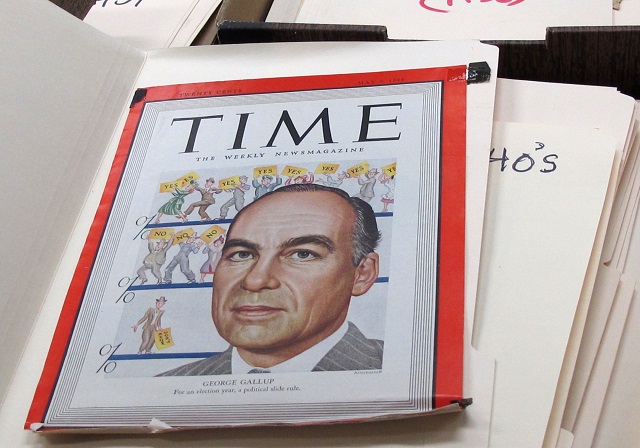
This 1948 TIME cover depicts George Gallup, widely considered the father of modern polling. Credit: AP Photo / Ryan J. Foley
If you ever watch, listen, or read the news, you’ll hear about political polls. There are polls for almost everything: Special congressional races, the popularity of the Iran Nuclear Deal, and of course, the president’s approval rating. According to polling experts Courtney Kennedy and Fred Yang, the barriers to conducting wide-reaching polls have diminished over the past several years, allowing new pollsters to enter the fray. We look at why not all polls are created equal.
Three Takeaways:
- Kennedy, the director of Survey Research at Pew Research Center, says that you used to need a lot of capital and support to conduct a quality poll. But with the rise of cheap tools via the internet, pollsters, like journalists, no longer need to be a part of established institutions.
- As a Democratic pollster and a partner with Peter D. Hart Research Associates, Yang gets to see behind the curtain of private political polling. These polls still seek to gauge public opinion as accurately as possible, he says, but ask different questions to get candidate-specific data.
- While Kennedy and Yang agree that new challenges will continue to crop up for polls, they’re still an important tool. Kennedy argues that they’re the best way we have of getting an unbiased view of what Americans believe.
More Reading, Watching, and Listening:
- To explain how specific polling techniques work (for those who aren’t necessary math people), Kennedy has created a series of videos describing Pew’s methods.
- Not sure which polls to trust? FiveThirtyEight has a lengthy list of pollsters, with grades and ratings based on both methodology and accuracy.
- To hear more about polls on a regular basis, check out The Pollsters podcast. Democrat Margie Omero and Republican Kristen Soltis Anderson break down stories in the news each week and the numbers behind them.

